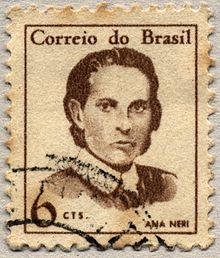Ana Néri
Ana Néri | |
|---|---|
 A stamp of Ana Néri | |
| Born | 13 December 1814 |
| Died | 20 May 1880 (aged 65) |
| Other names | Anna Nery |
| Occupation | Nurse |
| Known for | Introduction of modern nursing in Brazil |
| Spouse | Commander Isidoro Antônio Néri (1837–1843) |
| Children | Justiniano, Isidoro Antônio Filho, and Pedro Antônio |
Ana Justina Ferreira Néri (13 December 1814 – 20 May 1880) was a Brazilian nurse, considered the first in her country. She is best known for her volunteer work with the Triple Alliance during the Paraguayan War.
Biography
[edit]Néri was born in the Bahian village of Cachoeira de Paraguaçu to José Ferreira de Jesus and his wife, Luísa Maria das Virgens.[1] At age 23, Ana married Navy Commander Isidoro Antônio Néri.[2] With her husband always on duty, Ana became accustomed with running their house on her own.[2] She became a widow at age 29, having to take care of their children Justiniano, Isidoro, and Pedro Antônio by herself.[2] Justiniano and Isidoro became doctors, while Pedro Antônio joined the Army,[2] becoming a cadet.[1]
Work as a nurse
[edit]In 1865, Brazil joined the Triple Alliance in the Paraguayan War, and Ana's sons were all called upon duty,[2] in addition to both her brothers, Manuel Jerônimo, and Joaquim Maurício.[3] Unhappy with the fact that she would stay away from all the men in her family, she wrote a letter to Manuel Pinho de Sousa Dantas, governor of Bahia, offering to take care of injured soldiers of the Triple Alliance for the duration of the conflict.[2][3]
Later that year, Ana left Bahia for the first time in her life, assisting the Army's health corps,[1] which was small and had little supplies.[3] She started working alongside Vincentian nuns in a hospital in Corrientes, where she would take care of more than 6,000 hospitalized soldiers.[2][3] Not a long time later, she assisted the injured in Salto, Humaitá, Curupaiti, and Asunción.[2][3]
A wealthy woman, Ana founded a nursing house in the Paraguayan capital, then occupied and besieged by the Brazilian Army.[1][2][3] For that purpose, she used personal financial resources that she inherited from her family.[1][2][3] She worked selflessly there until the end of the war.[3] Her son Justiniano and a nephew who had enlisted as a volunteer, both died in battle.[3]
At the end of the war, in 1870, Ana returned to Brazil and received several honors, among them the distinctions of silver and humanitarian campaign medals.[1][2][3] Emperor Pedro II granted Ana, via decree, a lifelong pension, which she used to provide education for the four orphans that she had brought from Paraguay with her.[2][3]
Death and homages
[edit]Ana died on 20 May 1880, in Rio de Janeiro.[2][3] In 1926, Carlos Chagas named the first official Brazilian school of nursing after her.[2][3] Her full-body portrait, painted by Victor Meirelles, currently occupies a place of honor at the Salvador City Hall.[2][3] According to the federal law number 12.105, sanctioned by acting president José Alencar on 2 December 2009, Ana Néri is now a character of the Book of the Fatherland Heroes, and will have her name added in the Pantheon of the Fatherland and Freedom,[4] a monument in Brasília consisting of a steel book designed by Oscar Niemeyer.
She was portrayed by Cyria Coentro in the 2021 Brazilian historical telenovela Nos Tempos do Imperador.[5]
References
[edit]- ^ a b c d e f Vainsencher, Semira Adler. "Ana Néri". Pesquisa Escolar Online. Translated by Leamy, Peter. Fundação Joaquim Nabuco. Retrieved 11 December 2018.
- ^ a b c d e f g h i j k l m n o (in Portuguese) Ana Néri Biography at NetSaber
- ^ a b c d e f g h i j k l m n (in Portuguese) "Ana Nery - A Matriarca da Enfermagem no Brasil" at Portal Nosso São Paulo
- ^ (in Portuguese) Agência Brasil. "Anna Nery entra para o Livro dos Heróis da Pátria". Terra. 3 December 2009.
- ^ "Pilar vai à guerra como voluntária com Ana Néri; saiba quem é a atriz que fará a pioneira da enfermagem em 'Nos Tempos do Imperador'" (in Portuguese). Globo.com. 10 January 2022. Retrieved 12 January 2022.
